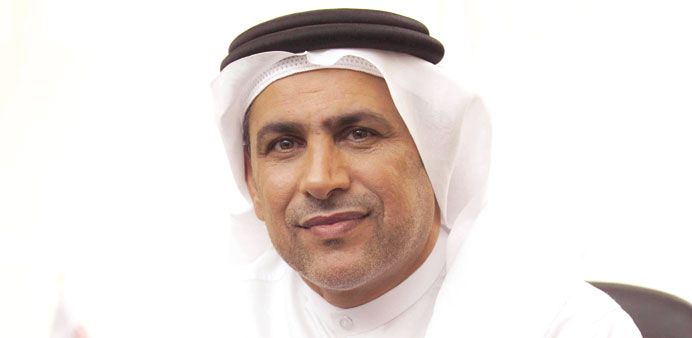Al-Mostafawi: Every sector to benefit from compelling Qatar growth story.
By Santhosh V Perumal/Business Reporter
Qatar’s banking industry is very strong and many of the lenders are gearing up to meet the new Basel III norms, the circular of which was issued early this year, HSBC Qatar has said.
“I will say the banking sector in Qatar is very strong and well supported,” HSBC Qatar CEO Abdul Hakeem al-Mostafawi told Gulf Times in an exclusive interview on the eve of the global lender celebrating 60th anniversary of its Qatar operations this year.
Observing that in the next five years as much as $200bn is planned to be invested in infrastructure, oil and gas, health, sports, education and other non-hydrocarbon sectors; he said ample opportunities exist in Qatar for everyone to play a role and everybody will be focusing on what value they can add.
“Qatar represents one of the most compelling emerging markets stories in the world. The country is talking about significant investments over the next ten years and it will give opportunities, not only to banks, but also to other sectors of economy,” he said.
On the strength of banks to participate in the growth story of Qatar, al-Mostafawi said the banks in the country are growing at a phenomenal pace with combined assets growing by 14% year-on-year and with a lower non-performing loans level of 2%. The banks have posted robust earnings and remain well capitalised with Tier I capital ratio in excess of 15%.
The Qatar Central Bank has been engaged with the banks here to make sure that by the time Basel III is reached, “we should not have any surprises.”
Basel III would support capital growth and strengthen balance sheet liquidity and make the banking sector more resilient to economic shocks,” said the top official of HSBC Qatar, which spins out more than $100mn in profits annually.
Qatar’s compelling growth story has a robust future with continued investments in infrastructure, expansion of the energy sector, intense focus on research and development as well as health and emphasis on education and sport, he said.
About HSBC, which started operations in Qatar in 1954; al-Mostafawi said it has always been involved with large government projects as it brought with it global knowledge for the local market, a model that was very successful. “The QCB has been very supportive of our value addition,” he added.
With an unrivalled global network and a rich heritage in Qatar, HSBC is well positioned to play a leading role in the development of the local economy and stays committed in its support to the country, al-Mostafawi said.
Asked how the composition of its operations has changed over the years, he said it rather reflected how the country evolved to become a force to reckon with in the energy sector and the financial landscape.
In 1954, HSBC was largely into trade financing and personal banking. When al-Mostafawi joined the bank 25 years ago, HSBC’s retail business was 70% and now it stands at only 10%.
“It reflects how the country and businesses have grown over the years and how Qatar has transformed as an important regional business hub,” he said.
Highlighting that wholesale banking today constituted roughly about 80%, al-Mostafawi said “we are very positive on wholesale banking.”
His confidence stems from the fact that Qatar is already on an overdrive on infrastructure creation and uplift, for which the government has outlined a massive outlay in the run-up to hosting the 2022 FIFA World Cup.
“2022 is certainly important, and so many get excited about it. But Qatar is building infrastructure, regardless of the World Cup. So there are lots of projects and planning happening,” he said.

